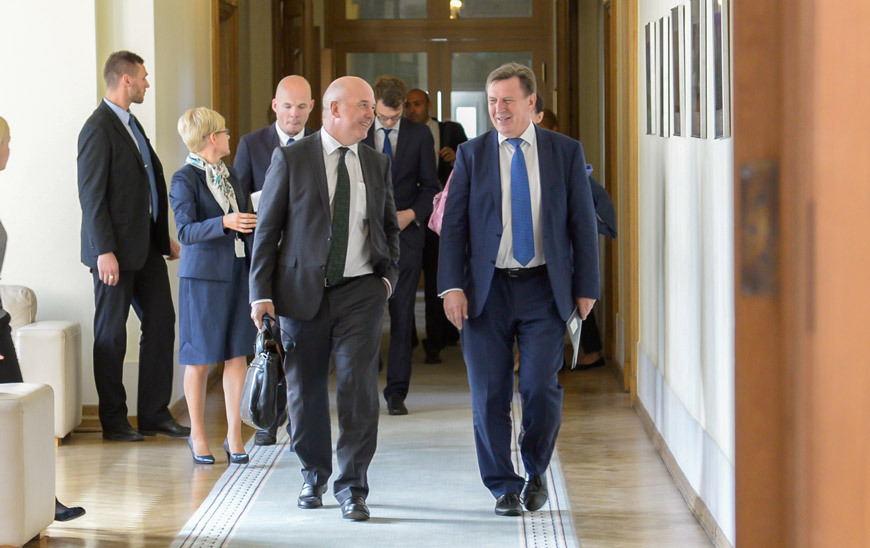“While Latvia has taken some important steps to advance human rights and reduce social exclusion, gaps remain in the protection of vulnerable groups. The authorities should develop community-based services for persons with disabilities, grant automatic citizenship to all children born in Latvia, and improve the legislative and policy framework to combat bias-motivated crimes and hate speech. Swift ratification of the Istanbul Convention and alignment of national law and practice with its requirements would also send a clear message of genuine commitment to equality and women’s rights,” said Nils Muižnieks, Council of Europe Commissioner for Human Rights, at the end of his five-day visit to the country.
The situation of persons with disabilities in institutions, in particular that of children with intellectual and psychosocial disabilities, continues to be of concern. More effective coordination and coherent action at national and municipal levels is required to take forward the stalled deinstitutionalisation process. Large institutions pose a higher risk of violence and sexual abuse to residents. The Commissioner encouraged the authorities to reinforce preventive action through investigating and sanctioning all reported cases of abuse and carrying out regular monitoring. To this end, he called on the authorities to ratify the Optional Protocol to the UN Convention against Torture and establish an adequately resourced National Preventive Mechanism. The Commissioner visited the Baldone State Social Care Centre which accommodates people with intellectual and psychosocial disabilities. “I was disheartened that children and adults continue to be placed in large institutions. Such institutions reproduce the vicious cycle of isolation, stigmatisation and discrimination. Instead, I call on the authorities to set more ambitious goals to develop community-based services and promote the right of persons with disabilities to live independently in the wider community.” said the Commissioner.
The Commissioner noted that amendments to the Citizenship Law have simplified granting citizenship to stateless children born to non-citizen parents. However, the procedure still requires one of the child’s parents to formally submit a request at the time of birth registration. The Commissioner urges the authorities to address this issue as a matter of priority and make the procedure entirely automatic. “Latvia should ensure that children effectively enjoy a right to a nationality from birth according to the requirements of the UN Convention on the Rights of the Child.”
Commissioner Muižnieks welcomes the signature by the Latvian authorities of the Council of Europe Convention on preventing and combating violence against women and domestic violence (Istanbul Convention). He also notes that the process of accession has stirred lively public debates about the objectives and principles of the Convention, and that some of the information used to advocate against ratification has not been factual. In this regard, the Commissioner would like to recall that violence against women is a violation of human rights and has long-term detrimental effects on the development of society as a whole. It is rooted in inequality and can be prevented by changing the social norms and practices that reproduce and perpetuate it, and the Istanbul Convention gives a roadmap to achieve that goal. “I call on the authorities to ratify the Convention and invest in raising awareness about its true aims and requirements. The authorities confirmed that data gathered in Latvia clearly shows that in the vast majority of cases women are the targets of domestic violence. Therefore specific laws and policies are needed to protect them.” Pending ratification, the Commissioner urges the authorities to continue and improve the already established policies and practices in this field. This particularly concerns disaggregated data-collection, establishing specialised and adequately-resourced women’s shelters, and strengthening the capacities of law-enforcement bodies and judges to identify, prosecute and sanction all forms of violence against women.
During the visit the Commissioner discussed the national framework for combating national, ethnic and racial hatred, and the protection of social groups, including LGBTI persons. He commends the improved policies to protect freedom of assembly, notably as concerns measures to protect gay pride events. At the same time, the authorities should deploy more efforts to build trust among the population in law enforcement bodies to report all instances of bias-motivated crime.
Lastly, the Commissioner discussed with the authorities the recent amendments to the Education Law regarding “morality in education” as well as the subsequently-developed guidelines. As a matter of principle, educational polices and materials should be human rights compliant, promote diversity and exclude discriminatory and degrading content regarding gender equality and LGBTI persons. “I encourage the authorities to develop age-appropriate educational programmes, including on sexual and reproductive health, in such a way that they overcome prejudices in society, promote equality between men and women, and address homophobic and transphobic stereotypes.”
The Commissioner’s report on his visit to the Republic of Latvia is forthcoming.



